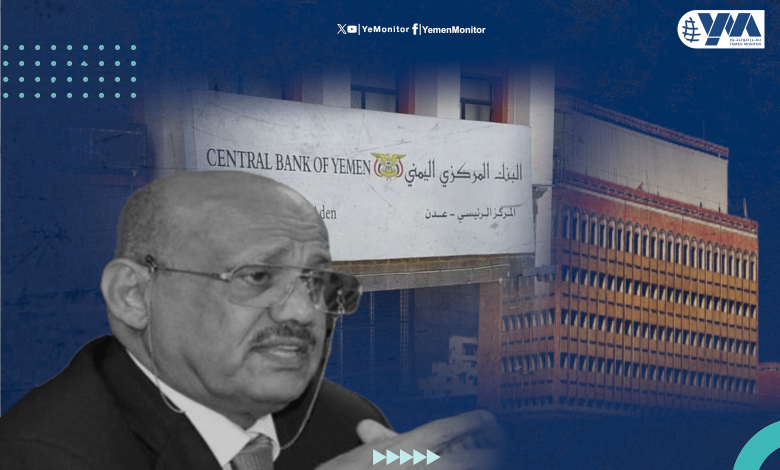The Central Banks Conflict in Yemen: Who Will Win?!

By/ Ahmed Jobran
In the world of economics, international relations and their cross-border effects cannot be ignored. In Yemen, this impact is clearly manifested through the conflict between the internationally recognized Central Bank of Aden and the non-internationally recognized Central Bank of Sana’a. This conflict directly affects the Yemeni economy and the lives of citizens in both regions.
The Central Bank of Aden has issued a decision to stop dealing with a number of banks that have not complied with its decisions, in addition to a decision to withdraw the old currency from the market. The bank aims to transfer the headquarters of banks operating in Sana’a to Aden, so that financial operations are under its control, and banks in Sana’a become mere branches and customer deposits remain as they are.
In contrast, the Central Bank of Sana’a has issued similar decisions, including stopping the dealing with banks that have not complied with its directives, and a decision not to deal with the new currency issued by the Bank of Aden.
Challenges
Each of the banks faces significant challenges:
Sana’a Bank suffers from a liquidity shortage and economic stagnation in all sectors, but it has succeeded in maintaining the exchange rate stability.
The internationally recognized Central Bank of Aden suffers from a deterioration in the purchasing power of money due to the deterioration of the exchange rates, which has led to economic inflation (rising prices), despite the existence of a relative purchasing movement.
Impact on citizens in case of Sana’a Bank’s win
If Sana’a Bank wins, the situation will not change much for citizens in the south, who have been accustomed to the deterioration of the local currency exchange rate and its negative impact for years. In the north, there will not be a significant positive impact, as citizens suffer from non-payment of salaries and stagnation of economic activity.
Impact on citizens in case of Aden Bank’s win
It is expected that the Bank of Aden will win, because it intends to use its international legitimacy to expel banks that refuse its decisions from the SWIFT international system, and to benefit from the change in the world’s point of view of Sana’a government due to the Red Sea events. This exclusion will deprive these banks of dealing with international banks on charges of working with “terrorist organizations”. This will lead to a deterioration in the reputation of these banks and their transformation into local savings banks only. Banks and citizens in Sana’a will be forced to deal with banks in Aden to carry out their international transactions, which will transfer foreign currency to Aden and lead to an improvement in the exchange rate of the local currency there. Consequently, the purchasing power of citizens in Aden and its surroundings will improve relatively. The future of the local currency in Sana’a remains unknown, as the Bank of Aden has issued a decision suggesting that the dealing with Sana’a currency will be stopped after 60 days.
Economically, it can be said that both parties are drowning in major problems, but the Bank of Aden has the advantage of international recognition, which gives it greater ability to influence the international financial scene. If the Bank of Aden can impose its control, this may lead to a noticeable improvement in the economic situation in the south, with the possibility of continued deterioration in the north.
In general, the conflict between the two central banks in Yemen reflects a complex reality of economic and political challenges. While both banks face significant difficulties, the ability to benefit from international legitimacy may be the decisive factor in determining the winner in this conflict. In any case, the Yemeni citizen remains the biggest loser in this conflict, awaiting radical solutions that will put an end to his economic suffering.
SWIFT System
The SWIFT system is an international network used to send and receive financial instructions between banks around the world. This system is essential for international financial transactions, and is subject to internationally recognized governments to approve or exclude banks in it, and any bank that is excluded from this system faces great difficulties in carrying out its international transactions.
The important thing is that the Bank of Aden’s deadline for banks to transfer their operations centers from Sana’a to Aden will expire on Sunday, and it seems that the Bank of Aden is determined to implement its decisions this time, and it has wide government and international support, and the decisions will not be retracted or the deadline extended, unless Saudi Arabia intervenes.
I hope that the two parties will reach an agreement to unify and neutralize the banking system in order to get the citizen out of the woes of this conflict… the crisis has prolonged and the people are getting tired.





